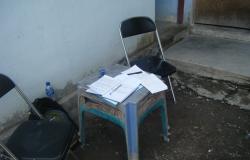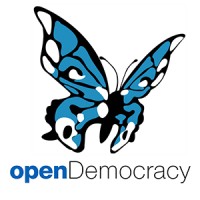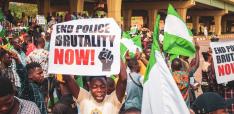Research as More Than Extraction? Knowledge Production and Gender-Based Violence in African Conflicts

Researching gender-based violence in African conflicts is ethically treacherous. A new series on Open Democracy looks at how researchers can avoid the worst pitfalls while working in the field.
Many different methods can be used to collect information. Most people start with the internet. Some even go to libraries. In most cases, the goal is to track down information that has already been collected by other people. However, there are also times when the required information is not available. In such cases, if you want specific kinds of information badly enough, it may become necessary to go out into the world and collect it yourself.
This is what researchers commonly refer to as fieldwork. Travelling to specific locations and asking people questions about their opinions and experiences. ‘Hanging out’ and observing how and why people behave in different ways. All of this may sound fairly straightforward, but once you delve a little deeper numerous ethical and practical challenges begin to emerge. Careful planning is required in order to ensure that the information which gets collected is as reliable as possible, and that specific findings are not overstated or misrepresented. Further measures are also required to ensure that no one participating in the fieldwork process comes to any harm – either physical or psychological – due to their involvement. This ethical obligation is sometimes portrayed as a version of the Hippocratic oath, where doctors commit to ‘do no harm’.
Many researchers (and journalists) do their best to adhere to this standard. Whenever they go out in the world to collect information, they try to ensure that no harm comes to the people providing them with answers. This can sometimes be a very challenging task. People who have experienced personal distress – violence, loss, displacement – are not always comfortable talking about their experiences, and they can sometimes risk retribution and/or trauma by sharing what they know.
This commitment to avoiding harm is undoubtedly important, but is it sufficient in ethical terms?
Ethics and politics cannot be separated
In order to address this question, we need to reflect upon how and why information gets collected, who does the collecting, who provides funding, and what kinds of agendas, audiences and historical legacies shape how information is packaged and disseminated. Once these issues are placed on the table, it quickly becomes clear that knowledge about our world tends to be produced and consumed on extremely unequal terms. Take, by way of illustration, the key question of who collects information. UNESCO recently estimated that the ‘Big Five’ – China, the European Union, Japan, the Russian Federation and the United States – accounted for 72% of researchers globally. Europe comprises roughly 11.4% of the global population, yet hosts around 31% of researchers. This can be contrasted with Latin America and South Asia, which host 3.6% and 3.1% of researchers against 8% and 23.3% of the global population. Only 1.1% of researchers are found in Sub-Saharan Africa.
There is a much larger story behind these numbers. Some locations and topics receive a great deal of attention and investment, such as research into baldness. Others get neglected, such as research into malaria. Moreover, European and North American experiences frequently provide the primary benchmarks against which other parts of the world get evaluated, contributing to a recurring tendency to both catalogue and rank the ‘failures’ of non-European peoples and institutions. This deeply rooted impulse to reduce ‘the rest’ to an imperfect mirror of ‘the west’ has a long and troubling history, which directly connects scientific knowledge to colonialism and imperialism.
Former colonial rulers, such as the French, Portuguese and British, continue to play major roles in producing knowledge about their former colonies, contributing to a larger pattern which involves privileged outsiders parachuting into ‘exotic’ locations for short ‘fact-finding’ expeditions. These incursions regularly involve local partners, but the terms of these partnerships can be extremely one-sided. This frequently comes down to the power of the purse. Control over funding plays a decisive role in choose which topics get prioritised, how they get talked about, and the kinds of outputs used to determine whether the partnership is successful.
These political dynamics raise all kinds of ethical challenges, where the longstanding injunction to ‘do no harm’ is revealed to be incomplete, rather than incorrect. To make sense of the issues at stake here, it can be helpful to draw a rough distinction between extraction and collaboration. Whenever mining companies extract resources, they dig into the ground and take away precious minerals to be processed and consumed elsewhere. The profits from mining flow to the companies and their shareholders. Knowledge extraction has similar features. Researchers go out in the world in search of information, do their best to ensure that no one gets harmed along the way (unlike most mining companies), and then go home to process their valuable findings for the benefit of their careers. Extraction cannot be dismissed as entirely unethical, since there are times when simply avoiding harm requires tremendous care and sensitivity. But it should nonetheless be regarded as minimum threshold which leaves considerable scope for further improvement and refinement.
Collaboration is easier to talk about than to effectively implement, so would it be a grave mistake to assume that anyone has all the answers. Whenever people and organisations come together around a common purpose or project, we suggest that the following questions are worth taking into account:
- How are overall priorities and plans of action discussed and finalised?
- Who is regarded as an ‘expert’? How is expertise determined?
- Who gets to speak, and on what terms? How much listening is actually taking place?
- How are the benefits associated with the production of knowledge distributed?
- Who holds the purse strings, and how do resources get distributed?
- How does information get packaged, and who has primary responsibility for interpretation?
- Who are the intended audiences? How do their expectations shape outcomes?
- What are the effects of historical legacies, hierarchies, and patterns of privilege?
- Who requires a visa in order to travel? Is the visa required easy to secure?
- When does collaboration get reduced to consultation, instruction or extraction?
This list is far from exhaustive, but it should nonetheless help to illustrate the kinds of ethical and personal questions which need to be foregrounded when thinking about what collaboration might look like. It is also important to recognise, moreover, that these are not the kinds of questions that can be definitively resolved, and thereby put aside. They are instead the kinds of questions that require ongoing self-reflection, discomfort, and a willingness to rethink established conventions. Systems of privilege and marginalisation cannot be wished away, so they need to be recognised and interrogated with a view to both changing and challenging the political terms of engagement. While collaboration is usually portrayed as a positive aspiration, the devil is in the details. Once collaboration becomes extraction, it may become necessary to cut the cord entirely and look elsewhere.
The above discussion is linked to a larger agenda, which emerges out of a collaborative project focusing upon gender-based violence in African conflicts. The formal title of this project is ‘Conjugal Slavery in War (CSiW): Partnerships for the study of enslavement, marriage and masculinities’. The inclusion of marriage is especially important, because it reflects a specific concern with wartime abductions that feature: 1) women and girls who are forced to marry their captors; and 2) men who are ‘assigned/given a wife’ by commanders, and/or who also endure sexual and gender-based violence. This combination of violent abduction and marriage has been documented in a series of armed conflicts in different parts of Africa. These include numerous atrocities perpetrated by the Lords Resistance Army (LRA) in Uganda, more recent abductions involving Boko Haram in Nigeria, and high profile international criminal proceedings involving defendants such as Charles Taylor (Special Court for Sierra Leone) and Dominic Ongwen (International Criminal Court).
Gender-based violence in Africa is not a topic which should be easy to write about. There are instead many complications and challenges which need to be factored into the equation, including:
- The effects of negative and simplistic portrayals of Africa and Africans, which leave their mark on how people write about Africaand collapse many viewpoints into a single story.
- The topic of sexual violence in war is closely associated with sensationalism, voyeurism, and exoticism, with similar kinds of stories being repeated time and time again.
- Violence tends to be classified in very different ways. Atrocities perpetrated by government agents, such as police officers or the military, are frequently overshadowed by atrocities perpetrated by the enemies of the state, such as the LRA or Boko Haram.
- The enduring effects of colonialism and white supremacy, which find expression – amongst other things – in the paternalism associated with the ‘white saviour industrial complex’.
Many other issues could also be added, but this brief snapshot should still be sufficient to illustrate that there are many pitfalls and pre-conceptions which need to be digested.
One way of grappling with some of these issues is to change the terms of the conversation. Patterns of sexual violence in wartime need to be connected to sexual violence in peacetime. Recent events need to be analysed in relation to the history and legacies of colonial rule in Africa. Patterns of sexual violence need to be understood in terms of both women and men, and governments and ‘rebels’. Interventions that are justified in humanitarian and paternalistic terms should not be taken at face value, but need to be scrutinised for their tensions, exclusions, and violence. The impulse to reduce complex issues to simplistic formulas – such as ‘buying freedom’ or ‘rescuing innocents’ – needs to be resisted, since there are times when ‘doing something’ can end up hurting rather than helping.
It is also important to keep in mind, moreover, that these are not the kinds of challenges which we should expect to resolve once and for all. As recent scholarship on the afterlives of slavery has repeatedly demonstrated, the weight of history can cast a shadow upon the present which is inescapable, and must therefore be carried. The many different ingredients which define who we are and where we currently stand must be interrogated and acknowledged, rather than set aside.
Who are we?
This is not a straight-forward task, since there are many occasions when ‘we’ primarily refers to ‘people who are like me’. It is therefore important to keep in mind that references to ‘we’, ‘us’ or ‘our’ frequently involve lines being drawn and/or assumptions being made. Depending on context, ‘we’ can mean all kinds of different things. We are activists. We are academics. We are researchers. We are survivors. We are European. We are African. We are not amused. We may all be human, but grand appeals to humanity as a whole are often grounded in specific viewpoints which end up being attributed to ‘humanity’ more generally. Each ‘we’ draws a line around a different group of people, and leaves others marginalised or on the outside. These lines are not always explicit, but that doesn’t make them unimportant. The need to reflect on who we are and where we stand does not look the same for everyone, but instead directs attention towards the powerful effects of layered identities.
These lines have all kinds of effects upon a project such as CSiW. Building upon five years of funding from the Canadian SSHRC, the project team includes six community-based partners located in Uganda, Nigeria, Rwanda, Liberia, Sierra Leone and Congo and universities in Canada, South Africa, and the United Kingdom. As with all large projects, different members of the project have different roles and responsibilities. They also occupy very different positions, since the team includes historians of slavery, activists and service providers who work with survivors of conflict violence, graduate students, and other researchers. The most important bond which unites the project team is a shared concern with understanding and challenging patterns of sexual violence in Africa. However, there are also any number of underlying differences and divisions which must be factored into the equation.
One of the most important issues here is funding. As numerous writers have demonstrated, funders based in the global north play a dominant role in deciding how projects which are located in the global south are organised and implemented. Funding streams play a crucial yet frequently overlooked role in determining which types of issues are targeted for interventions, how these issues get talked about, the types of activities which end up taking place ‘on the ground’, and the kinds of baseline criteria used to evaluate progress or success. Funding streams can also be linked to policy goals which are ethically dubious, such as stopping refugees or promoting homophobia.
Further layers also get introduced once higher education enters into the equation. Universities come with their own agendas, systems and languages. These assign a premium to outputs that are geared towards activities and audiences that academics care about, such as peer-reviewed publications written in English, abstract theoretical arguments which primarily interest other academics, and the training of the next generation of academics. Being employed as an academic also comes with all kinds of privileges for tenured faculty (although tenure is now increasingly rare, with the rapid growth of precarious contracts reinforcing larger internal hierarchies). Tenured academics tend to be paid well, have secure platforms from which to speak, and get recognised as distinguished experts.
Research cannot be yet another extractive industry
These and other related considerations have far-reaching ramifications for a project such as CSiW, which is concerned with patterns of sexual violence in Africa. And these are the issues the authors in this BTS series explore over the next month. Firstly, and most importantly, it is crucial to reflect upon how and why knowledge gets produced, and for what types of audiences. At the extractive end of the spectrum, there is a scenario where all of the major decisions get made in Global North, there is little or no local input, and the chief outputs are defined in terms of external interests. This has the effect of reducing local partners to ‘native informants’, whose main contribution is to produce ‘raw data’ which is subsequently interpreted and disseminated by external experts. The knowledge which is produced helps to advance academic careers, or international policy conversations, but very little comes back to local communities. At the collaborative end of the spectrum, there is a scenario where local interests and experiences play a central role in shaping the design and implementation of specific activities, which in turn generate knowledge which has value to the communities from which it came. This should not mean, however, that local voices are limited to speaking to local concerns, since collaboration ideally means shaping the overall terms of more general conversations and agendas.
In the spirit of exploring these essential and uncomfortable questions, the authors in this series of posts reflect on power and positionality; relational and participatory research methods; child participatory approaches in research; facilitated film screenings; informed consent and confidentiality; and psychosocial support for participants. Other key themes the contributors discuss include the challenge of researching legal institutions; the ethics and politics of research on sexual and gender-based violence; and the safety and security of researchers themselves. Often not discussed, the security of our NGO research partners is of utmost importance. Most importantly, there is no scenario where power relations and patterns of privilege do not play a fundamental role. ‘We’ cannot expect to respond to these kinds of challenges in the same ways.
Annie Bunting is Associate Professor of Law & Society at York University in Canada, specializing in international human rights, gender and culture. She is the Deputy Director of the Harriet Tubman Institute for Research on Africa and its Diasporas. You can learn more about her on her website or follow her on Twitter @anniebunting.
Joel Quirk is Professor in Political Studies at the University of the Witwatersrand, South Africa. His research focuses upon slavery and abolition, human mobility and human rights, repairing historical wrongs, and the history and politics of sub-Saharan Africa. Joel is currently a member of the International Scientific Committee of the UNESCO Slave Route Project, where he serves as Rapporteur. Your can follow him on twitter at @joelquirk.
This post first appeared on:



